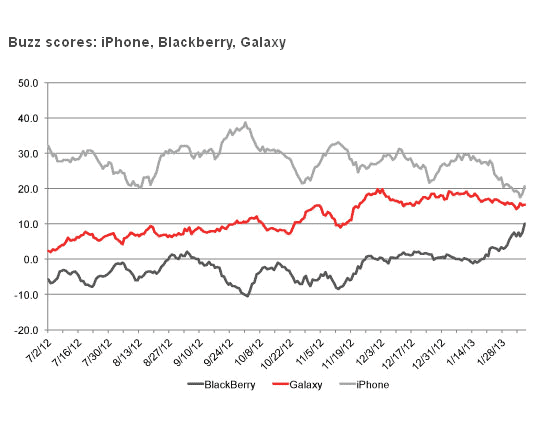
Four horse race. Amazon, Facebook, Samsung and Microsoft appear to be the favourites to partner with BlackBerry-maker Research in Motion. On May 29th, when Research in Motion hired JP Morgan Chase and RBC Capital Markets to review its “business and financial performance” with an eye towards leveraging “the BlackBerry platform through partnerships, licensing opportunities and strategic business model alternatives” the cards were on the table, if they weren’t already before.
The beleaguered Waterloo tech company, which reported another poor quarter this Thursday, seems to have reached a fork in the road. Most believe, like so many other Canadian techs of late, the company will be sold to a better capitalized US concern.
The one lifeline to independence is a broad-based partnership. In 2012, the rumours about a RIM partnership have been as consistent as the potential candidates have been varied. But which deal makes the most sense? We break down the top candidates.
Amazon: 10:1
A report from The Sunday Times surfaced early last week, suggesting RIM was considering splitting itself into two companies, dividing its hardware business and its network. A candidate to buy the hardware side of the business, suggested the UK-based paper, was Seattle-based Amazon. While RIM found a salable price point for its BlackBerry Playbook last year, offering up the no-longer available 16GB version at $199, that price was actually below the cost of materials for the device. Amazon’s mountains of content could help RIM devices sell at price points that would beat competitors such as Apple, but Amazon’s own Kindle appears to be filling that void satisfactorily.
________________________________________
This story is brought to you by Zecotek Photonics (TSXV:ZMS). As of November 16, 2011, Zecotek owned title to or controlled more than 55 patents and applications. Click here to learn more.
________________________________
Samsung: 8:1
According to several sources, a new Samsung Galaxy phone featuring Samsung Approved For Enterprise (SAFE) features will hit the US market next month. In January, a range of Samsung products, including the Galaxy S II and the Galaxy Tab joined Research in Motion in receiving Federal Information Processing Standard 140-2 (FIPS) certification from the US National Institute of Standards and Technology (NIST). The FIPS certification means the NIST believes the devices are safe for use by government agencies and private institutions that handle secure data. Samsung is clearly targeting RIM’s enterprise business. But tech writer Carmi Levy believes a RIM-Samsung deal would make a lot of sense for both companies. Samsung’s consumer momentum combined with RIM enterprise credibility would give a partnership instant credibility, he believes. “Sure it’s flying high on Android, but it’s still a me-too play.” he says, adding: “A RIM connection would separate Samsung from the crowd. ”
Facebook: 7:1
In May, Nick Bilton of the New York Times reported that, spurred on by a patchwork mobile strategy that was the main impetus for the billion dollar purchase of Instagram, Facebook “hopes to release its own smartphone by next year”. The company had been hiring engineers and developers, reported Bilton, some coming from Apple. Former RBC analyst Mike Abramsky, who has followed RIM for years, says a RIM-Facebook deal would represent an instant solution to its problems. RIM’s services business, which is generating about $4-billion in revenue, would immediately double Facebook’s profit and give it the mobile platform it needs to compete with Apple and Google. What’s more, RIM’s wildly successful chat system, BlackBerry Messenger, would appear a perfect for Facebook’s famous “walled garden” business strategy.
Microsoft: 5:1
This is the oldest horse in the race, but perhaps the one with the best shot. Of all the CEOs in this group, no one has spent more time in Waterloo than Steve Ballmer. The Microsoft CEO even showed up in Orlando at RIM’s own BlackBerry World conference last year, stepping up to the podium on day one to announce that Microsoft was going to “invest uniquely into the BlackBerry platform”. Turns out, all Ballmer was referring to was the decision to make Microsoft’s Bing search engine the default search provider in the BlackBerry browser. But could the same same scenario be replayed with something more substantive on the line? In April, a rumour reported in Benzinga’s M&A Chatter section sparked a fresh round of speculation that the Redmond, Washington company will invest $3.5-billion into Research in Motion. Some believe there would be enough value in RIM just for its intellectual property assets. Increasingly, defensive patent aggregation is seen as a necessary guard against IP litigation. Others, however, believe that Microsoft would simply assign the RIM handset business to Nokia and keep RIM’s secretive and secure enterprise network for itself.
____________________________________
____________________________________
Comment
Leave a Reply
You must be logged in to post a comment.





 Share
Share Tweet
Tweet Share
Share




Rogers in Canada will buy Rim
Richard Branson 4:1
“RIM’s services business, which is generating about $4-billion in revenue, would immediately double Facebook’s profit”
So, are you saying that RIM is doing about 50% of Facebook’s level of business? So why would RIM bother with joining up with a clunker like Facebook. It’s like a hockey team joining up with a girl’s volleyball team. What would be the point?